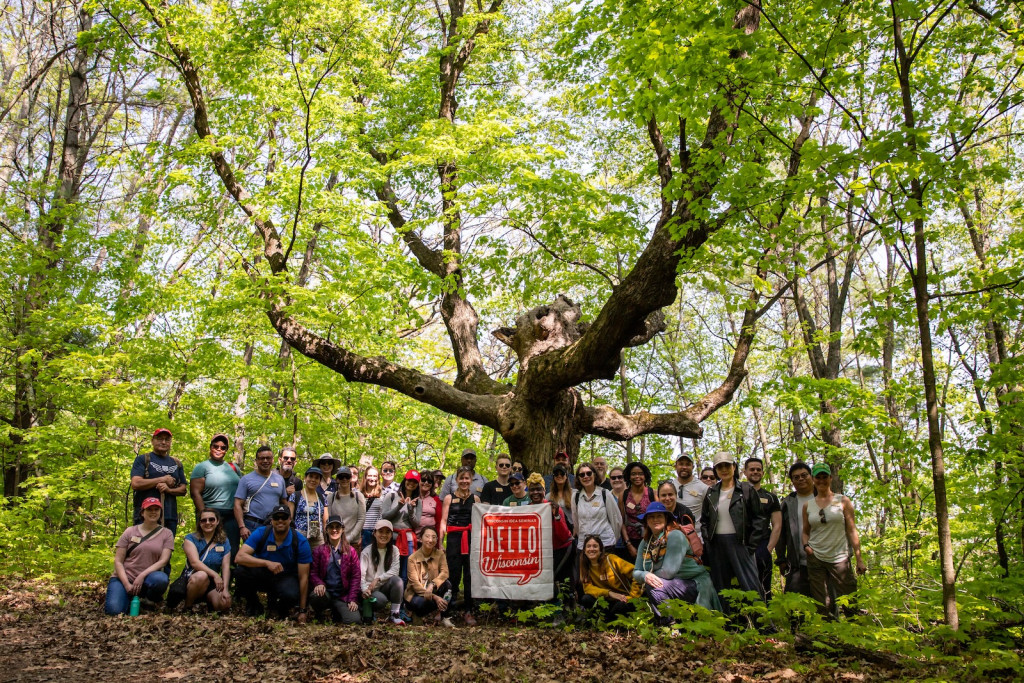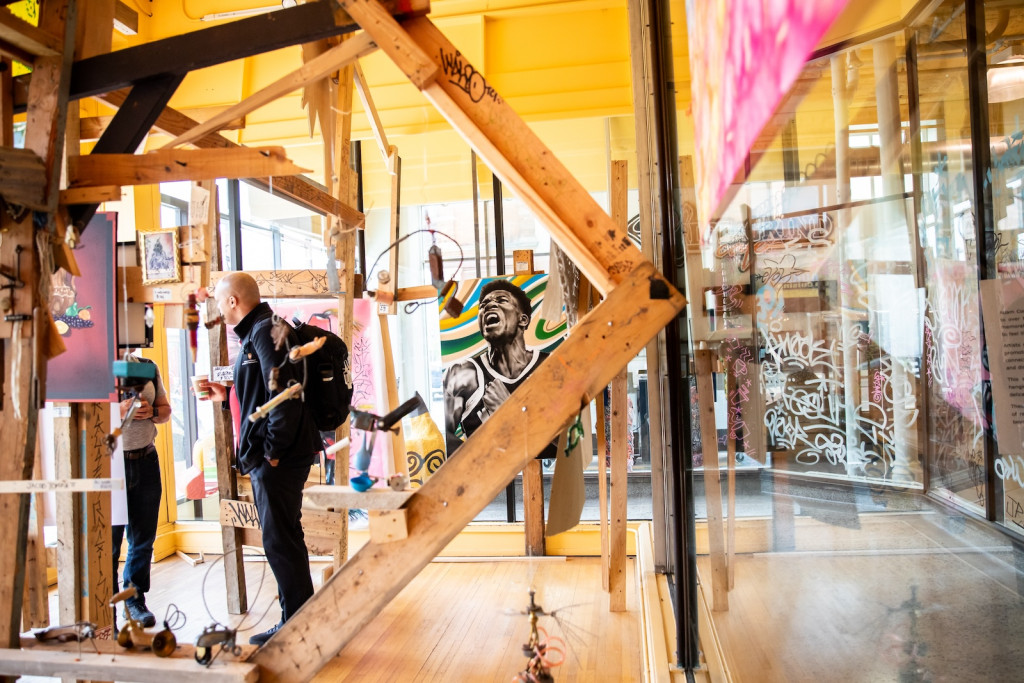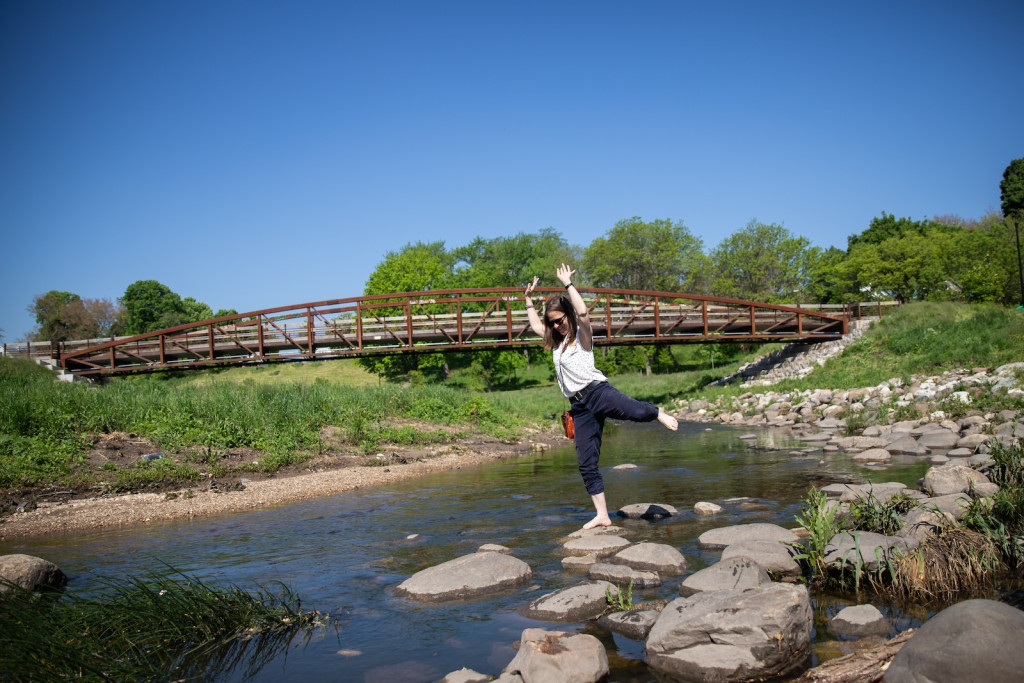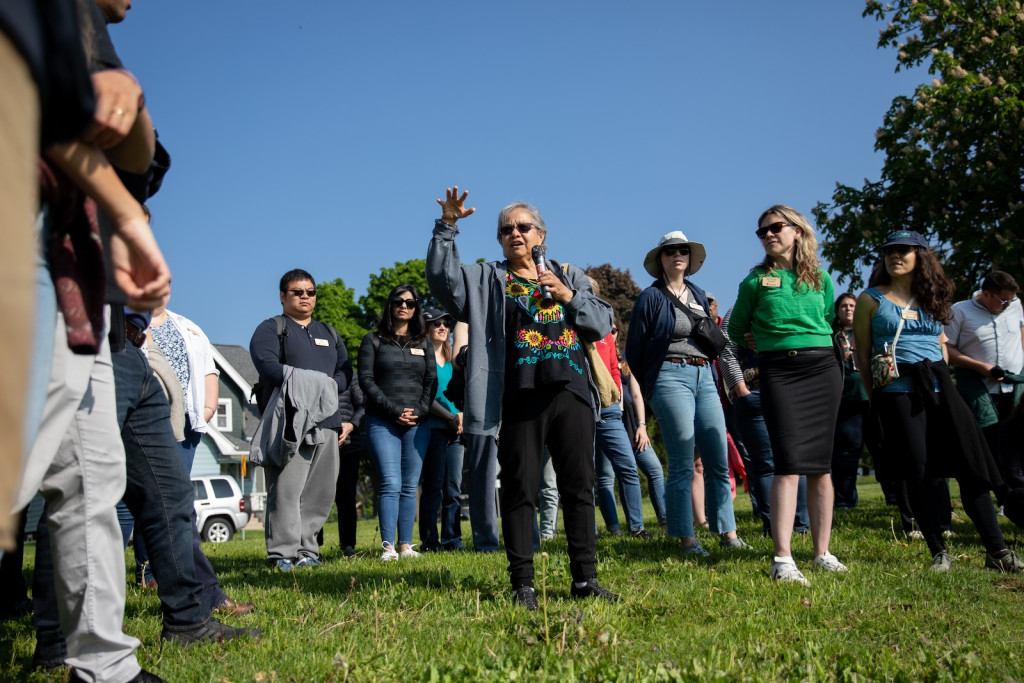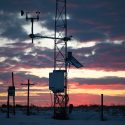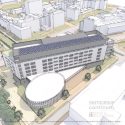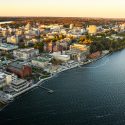Faculty and staff explore state’s rivers, culture and more in Wisconsin Idea Seminar
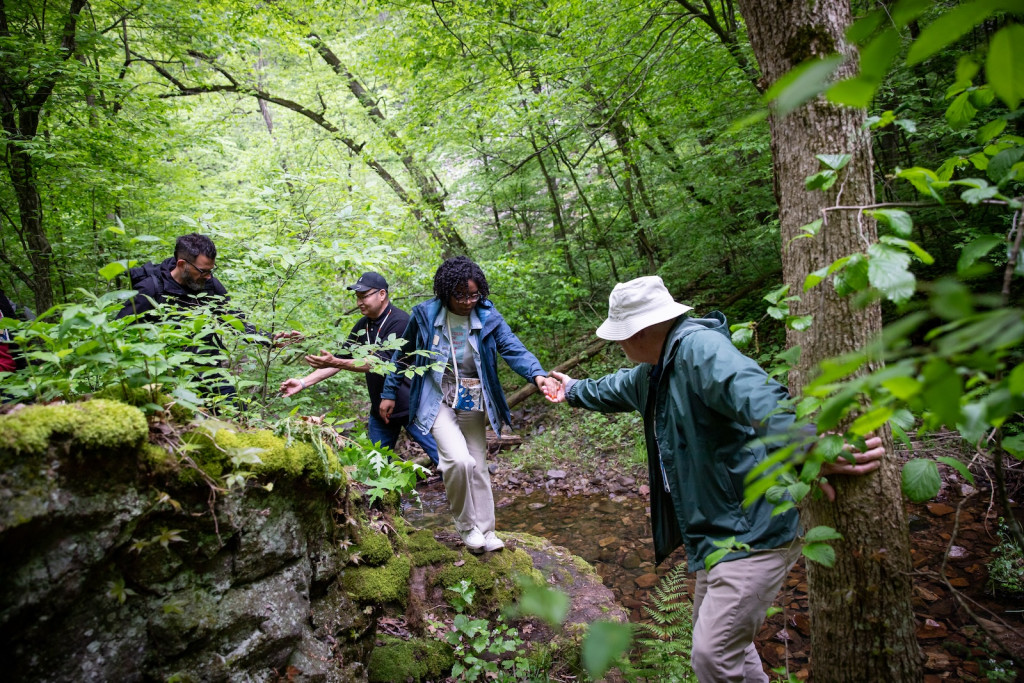
Bill Quackenbush, tribal historic preservation officer of the Ho-Chunk Nation, and Dennis Lloyd, director of the University of Wisconsin Press and participant of the 2024 Wisconsin Idea Seminar, extend their hands to help seminar participants cross a rocky bend on the group’s walk through Maa Wákąčąk, sacred Ho-Chunk land at the foot of Wisconsin’s Baraboo hills. Photo by Catherine Reiland/UW-Madison
Editor’s note: Assistant Vice Provost Catherine Reiland is director of the Wisconsin Idea Seminar.
After learning how to create a warp with cattails, the Wisconsin Idea Seminar participants began to weave, methodically crossing cattail fibers to create a small mat, talking and meditating on the meaning of their project.
“Protecting the water is to care for the cattails and the bulrushes,” Melanie Tallmadge Sainz, an artist and enrolled member of the Ho-Chunk Nation, had told them at the start of the workshop. It was an invitation to consider the interconnectedness of land, people and water.
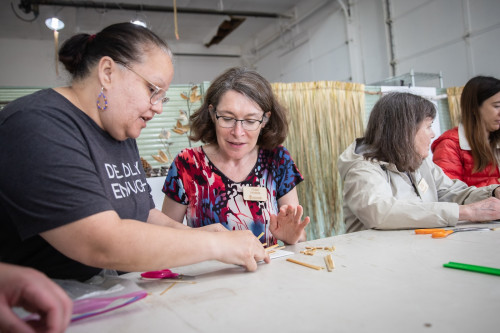
Molli Pauliot, a UW–Madison PhD Candidate in Anthropology and Ho-Chunk natural fibers artist, gives a quick primer to Fran Vavrus, vice provost and dean of UW–Madison’s International Division, as she learns to weave cattail at the Little Eagle Arts Foundation. Photo by Catherine Reiland/UW-Madison
The workshop was held at the Little Eagle Arts Foundation’s studio in the heart of Maa Wákąčąk — sacred land for Ho-Chunk people— about ten miles south of Baraboo.
The Wisconsin Idea Seminar participants had just visited the Ho-Chunk Nation’s House of Wellness to learn about community-driven healthcare, and soon after had walked along a spring-fed stream at the foot of the Baraboo Hills to experience the land restoration efforts that the Ho-Chunk Nation is leading on the parcel of land that was once the site of the Badger Army Ammunition Plant.
Weaving with an aquatic plant was a fitting way to begin a 500-mile journey where 41 University of Wisconsin–Madison faculty and staff spent a week as students of Wisconsin life to contemplate cooperation, belonging, water, and place. Their teachers were more than fifty collaborators and hosts across the state, representing a wide range of fields.
The Wisconsin Idea Seminar is an annual five-day journey through Wisconsin that offers faculty and staff the opportunity to learn firsthand about the social and cultural contexts that shape the lives of many of our Wisconsin students, and to see what the Wisconsin Idea looks like when it is rooted in local communities and shaped by local priorities. The 2024 experience engaged a variety of themes including health, healing, creative placemaking, K-12 education, incarceration, dairy, and how rivers and people have shaped each other.
The state’s rivers, including the Mississippi, the Wisconsin, the Kickapoo, the Trempealeau, and the Kinnickinnic, structured the group’s exploration of Wisconsin life.
In the Kickapoo Valley Reserve, located in the non-glaciated and ancient landscapes of Wisconsin’s southwest, participants walked across the Kickapoo River at the historic Bridge 13, one of Wisconsin’s few remaining metal truss bridges that was refurbished in 2017 in collaboration with the Ho-Chunk Nation.
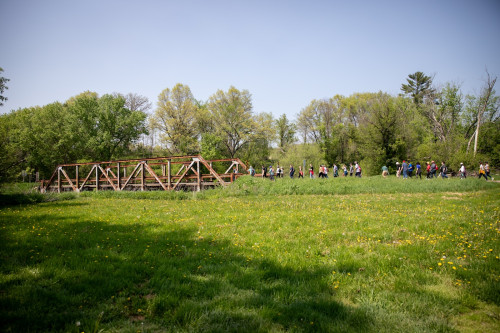
Bill Quackenbush, tribal historic preservation officer for the Ho-Chunk Nation, leads the 2024 Wisconsin Idea Seminar across Bridge 13 in the Kickapoo Valley Reserve.c’m Photo by Catherine Reiland/UW-Madison
They met with health practitioners who are supporting the next generation of health professionals through collaborations with UW–Madison’s Native American Center for Health Professions.
They conversed with colleagues at UW–La Crosse to learn how they tightly weave community engagement into the undergraduate research experience. Health practitioners, including doctors from La Farge Medical Clinic, and Mark Louden, professor in the Department of German, Nordic, and Slavic+, spoke about the importance of cultural humility and trust-building with surrounding Amish communities and their appreciation for UW–Madison’s collaborative role in bringing world-class healthcare and expertise to Vernon County.
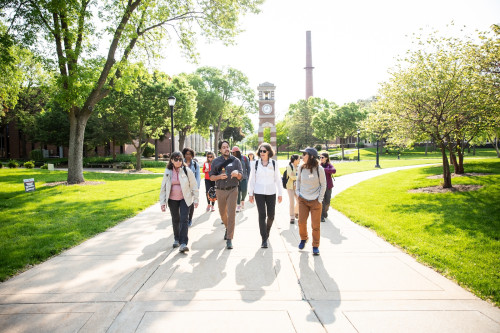
Wisconsin Idea Seminar participants stroll across the UW-La Crosse campus with Omar Granados, who spoke on a panel earlier that morning on community-engaged scholarship. Omar Granados is an associate professor of global languages and cultures at UW-La Crosse, and his current work includes a public history project on the stories of Cuban refugees at Fort McCoy in the 1980s. Photo by Catherine Reiland/UW-Madison
In Arcadia, they met with K-12 educators who value their strong partnerships with area colleges and universities to support their students and families.
At the banks of the Wisconsin River, Stevens Point-area food producers gathered at Bukolt Lodge to share their small-batch products, including hydroponic lettuce, pickled vegetables, and maple syrup, and to talk about how they collaborate with each other and local nonprofits to support community development and food economies in central Wisconsin.
At Mitchell Street Arts in Milwaukee’s south side, participants learned about the power of storytelling for formerly incarcerated people and their families who are working to make communities stronger. The morning sun was bright at Alice’s Garden, a 2-acre urban farm in Milwaukee’s north side, when the Wisconsin Idea Seminar participants were invited to slow down and pause to appreciate the abundance and then harvest from the garden’s swaths of mint, sage, okra, hyssop, lovage, and collard greens.
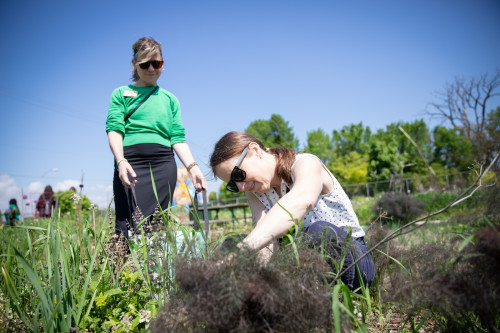
McKenzie Zdrale of the Wisconsin Foundation & Alumni Association holds open a bag as Chell Parkins, dance department, harvests fragrant fennel fronds during a guided activity at Alice’s Garden, a 2-acre urban farm near Milwaukee’s Fond du Lac Avenue. Photo by Catherine Reiland/UW-Madison
And they ended our journey like they began, among grandmothers who are deeply committed to the health and wellbeing of their communities, who bring forth ancestral knowledge to inspire the present and future, and who fundamentally believe that to care for the waters of Wisconsin is to care for us all.
And at nearly every stop, they met with UW–Madison alumni who are proud of their alma mater and who bring a Badger spirit to the work they do in their home communities.
The Wisconsin Idea Seminar is a program of the Provost’s Office and is made possible with the support of many UW–Madison schools and colleges and the Evjue Foundation, the charitable arm of the Capital Times and long-time underwriter of the Seminar since 1985.
A special thanks to Rachel Niles, executive assistant in the Office of the Provost, and Kelly Copolo, academic program specialist in the Division of Teaching and Learning, who offered excellent assistance that contributed to the success of the 2024 Wisconsin Idea Seminar.
Some participants offered their perspectives on the trip:
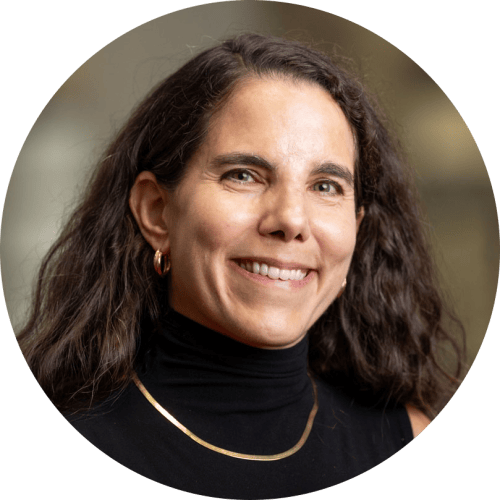
Daniela Drummond-Barbosa
Daniela Drummond-Barbosa
Professor, genetics, CALS
“The Wisconsin Idea Seminar trip was an amazing experience! It was very inspiring to learn about various communities that make up Wisconsin and to meet so many selfless individuals that put their minds, hearts and souls into improving their communities. Sharing the bus with fellow UW faculty and staff, learning about their roles at UW, and making new human connections was a very special part of the experience.”
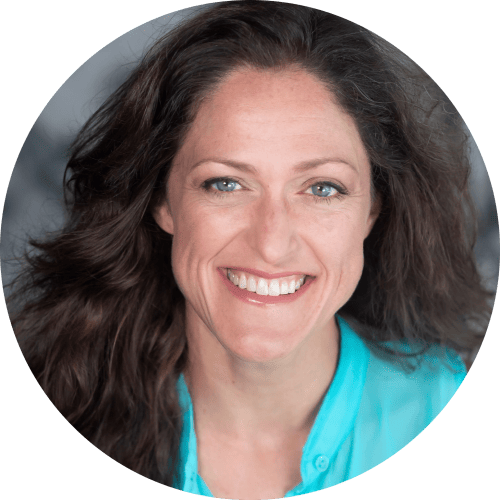
Samara Frame
Samara Frame
Advancement Manager, Division of the Arts
“Being new to UW–Madison, I didn’t have a sense of what the Wisconsin Idea looks like in action. The many ways in which Extension and alumni across the state are affecting positive change and creating partnerships is so apparent now. I see it now, and am fully invested in the Wisconsin Idea!”

Meenu Verma
Meenu Verma
Associate Director, UW Veterinary Care, School of Veterinary Medicine
“The Wisconsin Idea Seminar is an immersive experience and goes way beyond any work conference you would ever attend. We got to hear many impactful stories and meet incredible people during our journey, and it touched every sense of being — from the food we ate, to the stories we heard, to the people we met and the places we visited. I have a greater appreciation for people in Wisconsin who have been caring for the land for thousands of years and for those who have moved to Wisconsin in recent years.”
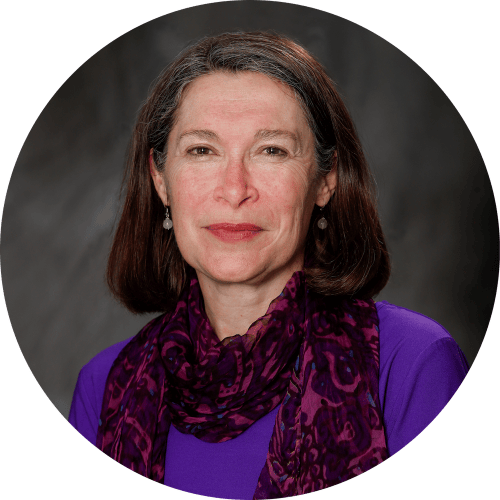 Fran Vavrus
Fran Vavrus
Vice Provost and Dean, International Division
“The Wisconsin Idea Seminar deepened my understanding of the many contributions that immigrant communities are making to education and industry in rural and urban communities across Wisconsin. I will weave these observations into my work to promote the international dimensions of the Wisconsin idea in our state and around the world.”
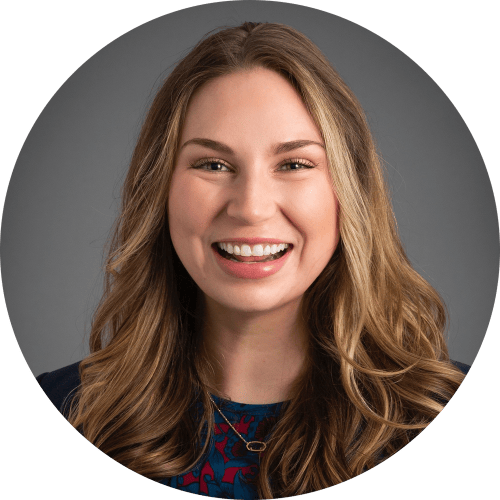
Jeanette Comstock
Jeanette Comstock MD
Assistant Professor, dermatology, School of Medicine & Public Health
“The Wisconsin Idea Seminar was a chance to be a student again. To say it enhanced the way I think about my career is an understatement. The extremely well planned and detailed week is designed to provide insight into the history, culture and presence of the different groups throughout the state. I learned of the specific challenges faced by certain groups and I will take these lessons back to my practice as a physician. It was truly an honor to interact with our hosts throughout the state!”
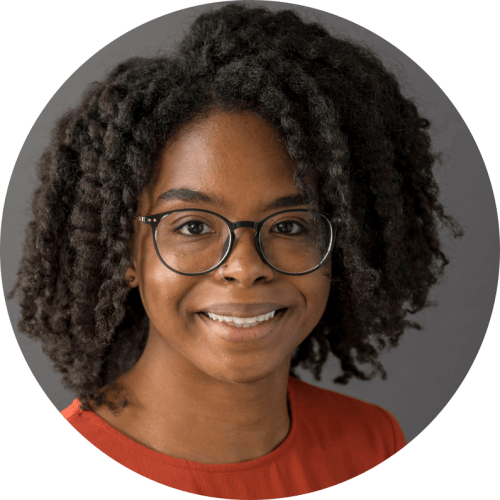 Morgan Jerald
Morgan Jerald
Assistant Professor, psychology
“The Wisconsin Idea Seminar instilled in me a profound sense of connectedness to the university community and the communities we serve across the state. Among the seminar’s many impactful experiences, our day with Ms. Venice Williams at Alice’s Garden and The Table stands out as particularly meaningful, both personally and professionally. Ms. Williams’ work to foster the health and healing of both the people and the land of Milwaukee reignited a sense of purpose and commitment to my own research on Black women’s well-being and to thoughtfully engaging in community-based scholarship.”
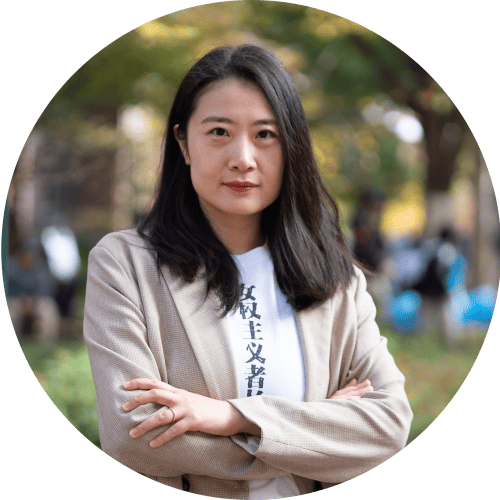
Jing Wang
Jing Wang
Assistant Professor, School of Journalism & Mass Communication
“Deep listening is not a given; it is a precious gift to be learned, practiced, and cultivated in a supportive, communal space. The Wisconsin Idea Seminar gave me the chance to witness the magic of deep listening. We, as a group, learned to listen to each other and to people across different communities in Wisconsin with care. I’d love to further weave this skill into my ethnographic research as well as teaching and mentoring in the future.”
 Erla Heyns
Erla Heyns
Dean and Vice Provost of Libraries
“I am new to Wisconsin and to UW–Madison. I worked at other land grant universities but have never experienced anything like this and I feel very fortunate to be introduced to the rich legacy of the engagement of the university in the state. Community engagement was richly highlighted during the Wisconsin Idea tour and was truly inspirational. Looking to the future, I am committed to creating pathways for the UW–Madison Libraries to contribute in very tangible ways to the Wisconsin Idea. This has been my goal since I arrived in January 2024 and started my new role as Dean and Vice Provost of Libraries, and now this goal is even more meaningful.”
Subscribe to Wisconsin Ideas
Want more stories of the Wisconsin Idea in action? Sign-up for our monthly e-newsletter highlighting how Badgers are taking their education and research beyond the boundaries of the classroom to improve lives.

